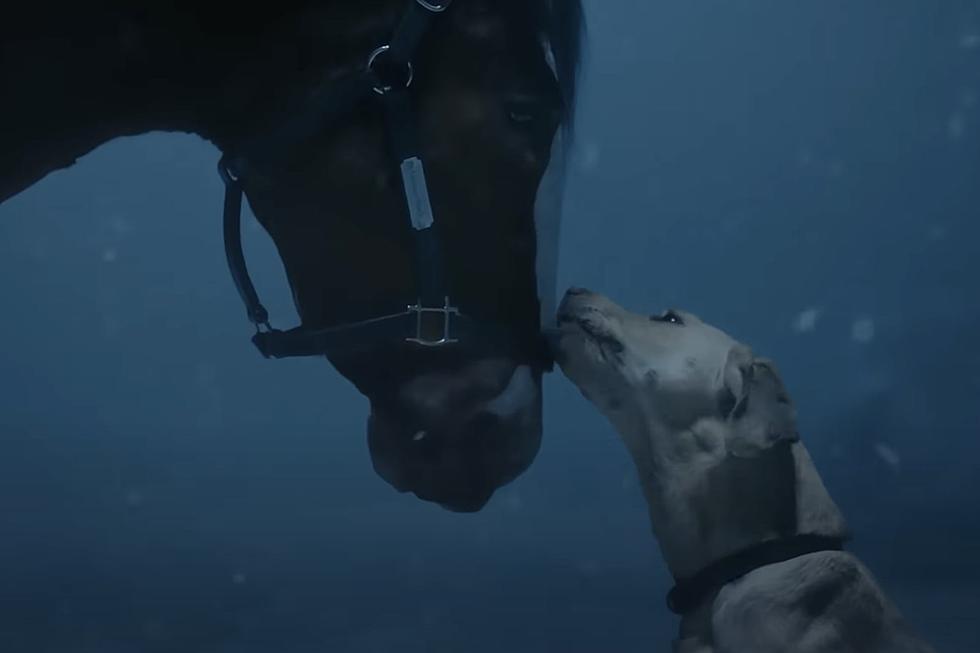
How the Band Struggled to Cope With Fame on ‘Stage Fright’
The Band delivered a classic with their self-titled second album in 1969 — but almost as quickly as they found their groove, they started falling apart. The fissures in the Band were evident with their third record, Stage Fright.
Released on Aug. 17, 1970, the album retained the rough-hewn sound of its predecessor while continuing to highlight the group's virtuosity — each member played at least two instruments on the album — and adding a bit more of a rock feel than they had on The Band. But it was hard to miss the sense of darkness that loomed over the record as a whole — and hard not to miss the once-plentiful vocal harmonies that seemed to be less of a focus in the new songs' arrangements.
Part of the change might have been a function of time, or lack thereof. As drummer Levon Helm explained to Hit Parader, their relatively leisurely pace while recording The Band may have produced a more fully realized album, but it also left a painful financial sting. "When you've had two records and you still can't pay your bills ... you get to figure something ain't quite right," he pointed out. "Doing it the other way costs so much money."
To avoid ending up in the hole again, the group decided to record their next album at the intimate Woodstock Playhouse in upstate New York. Initial plans called for it to be tracked as a true live album, in front of an audience, but as soon as word got out that the Band would be putting on an exclusive show, demand for tickets so far exceeded supply that they decided to do it in front of an empty theater.
While plans for Stage Fright were coming together, the bonds between the Band members were being tested by a number of complicating factors, including the growing issue of songwriting credits.
In his memoir This Wheel's on Fire, Helm recalls being shocked by the liner notes of The Band, realizing that guitarist Robbie Robertson had claimed sole authorship of most of the record — and although Helm admitted to being assuaged by assurances that the royalty imbalance would all be taken care of in the end, the creative tension in the group would only worsen over time.
"The level of the group's collaboration declined," Helm observed, "and our creative process was severely disrupted. ... Who wanted to pour out their souls and not get credit? [Richard Manuel] stopped writing completely after awhile, and I don't think [Garth Hudson] got much credit at all until some of the final records."
Listen to the Band's 'Stage Fright'
But even if creative issues hadn't eroded the Band's camaraderie, there's a good chance they still might have been undone by a far less obvious culprit: their own sudden success. After spending years backing up Ronnie Hawkins and Bob Dylan, they hit the Top 30 with their 1968 debut, Music From Big Pink, and then leapfrogged into the Top 10 with The Band. Their lives — and their habits — quickly changed.
"If you’ve never made a million dollars overnight, like we did, you have no concept of what it can do. We saw it ruin people — kill them! Suddenly we had all the money we needed, and people were falling over themselves to make us happy, which meant giving us all the dope we could stand," recalled Rick Danko in This Wheel's On Fire.
"People wanted to turn us on for free, do us favors, and some of us were happy to be taken care of like that. There wasn’t anything real dramatic about it, because it was a fact of life, and probably still is. I’m here to tell you that it’s a crying shame to see what success can do to some people. I’m sure it wasn’t the best thing that could have happened to the band."
"Mentally, healthwise, success was not the best thing for the Band," Robertson told Musician. "It confused people. It brought out where people were striving or pushing. The inspirational factor had been dampened, tampered with in a certain kind of way. The curiosity wasn't as strong. We didn't compensate for it, we didn't try. We just did what we did and, rather than it being a consistent thing for a period or something, it was not the center anymore."
"The drugs were just part of the dark mood that settled upon us," countered Helm. "There were also the issues of artistic control of the Band the direction we were going in — if any."
Compounding all these issues was the pressing need for product. Per the usual custom of the day, Stage Fright arrived hot on the heels of The Band — less than a year after its predecessor. Even taking into account its purposely abbreviated recording time, Fright was a record that Helm, for one, believed would have benefited from more time. Perhaps as an indication of its speedy gestation, the album was actually give a pair of parallel mixes — one by Glyn Johns, whose work made the final cut, and one by a young Todd Rundgren.
The record's success couldn't salve the fractures between the members of the Band, however, and subsequent efforts found their creative dynamic slowly leaking out as they retreated to separate spheres — a state summed up by the title of their final studio effort, 1977's contract-fulfilling Islands. While they'd only improve as a live act over the decade to follow — achieving a transcendency later captured in The Last Waltz — Stage Fright sounded a warning that no one in the group was able or willing to heed.
"It was a dark album, and an accurate reflection of our group's collective psychic weather," Helm observed in his book. "We all realized something was wrong, that things were beginning to slide."
Top 10 Concert Films
See Levon Helm in 25 Interesting Rock Movie Facts
More From Ultimate Classic Rock









